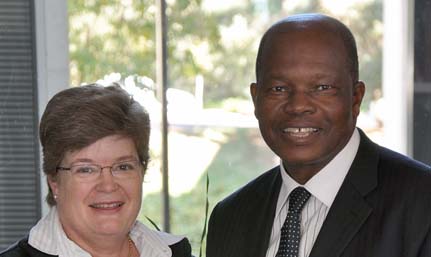Latest News Archive
Please select Category, Year, and then Month to display items
12 October 2020
|
Story Arina Engelbrecht
|
Photo Supplied
 Arina Engelbrecht from Organisational Development and Employee Well-being believes physical activity has a number of benefits for one’s health, including stress relief.
Arina Engelbrecht from Organisational Development and Employee Well-being believes physical activity has a number of benefits for one’s health, including stress relief.
Being physically active plays a big role in preventing the development of mental-health problems and in improving the quality of life of people experiencing mental-health problems.
Treatment for depression
Physical activity can be an alternative treatment for depression. It can be used as a stand-alone treatment or in combination with medication and/or psychological therapy. It promotes all kinds of changes in the brain, including neural growth, reduced inflammation, and new activity patterns are formed that promote feelings of calm and well-being. It releases endorphins – powerful chemicals in the brain that energise your spirit and make you feel good.
Physical activity can be very effective in relieving stress. Research in adults has found that physically active individuals tend to have lower stress levels compared to individuals who are less active. It also leads to improved sleep. When a person sleeps better and feels more rested, overall quality of life improves. They cope better with daily life stressors.
Reduce Alzheimer's risk
Regular physical activity can reduce your risk of developing Alzheimer's disease by up to 50%. It can also slow down further deterioration in those who have already started to develop cognitive problems. It stimulates the brain’s ability to maintain old connections as well as to make new ones.
A study asked people to rate their mood immediately after periods of physical activity (e.g. going for a walk/run, cycling, doing housework) and periods of inactivity (e.g. reading a book or watching television). Researchers found that participants felt more content, more awake, and calmer after being physically active compared to after periods of inactivity.
In conclusion, people who are physically active feel a sense of well-being, feel more energetic throughout the day, sleep better at night, have sharper memories, and feel more relaxed and positive about themselves and their lives.
“Being physically active not only changes your body, it changes your mind,
attitude, and your mood.” – Arina Engelbrecht
Valuable advice for businesses in difficult times
2013-04-15
|
 |
|
Prof Helena van Zyl, Director of the Business School, and Dr Reuel Khoza.
Photo: Stephen Collett
15 April 2013 |
Dr Reuel Khoza, Chairman of the Nedbank Group, shared the group’s valuable rules for managing a bank in difficult times in an MBA lecture on the Bloemfontein Campus. Dr Khoza is a visiting professor at the UFS Business School.
He focused in the lecture on the group’s business and leadership model and highlighted some do’s and don’ts:
- Do not surprise your stakeholders on the downside – communicate transparently, particularly when there is bad news.
- Retrenching staff to contain costs should be a last resort – the damage to corporate culture from retrenchments is immense. Follow and support your customers – get as close to them as possible because business changes slowly, but customer behaviour can change in an instant.
- Integrated central capital and funding management.
- Entrench well-established reporting, KPIs and measurement systems.
- Ensure strong independent risk management.
- Manage your cost base – anticipate downturns and re-base your costs to avoid crisis-cost management.
- Take advantage of opportunities – an economic downturn creates a situation where valuations fall and assets are sold off, which can be a great opportunity for acquisitions.
- Keep innovating – innovation does not have to be a costly exercise, as the right culture can promote and encourage experimentation and collaboration.
- Whatever you do – avoid a price war, as expedient pricing decisions may hurt the business in the longer term.